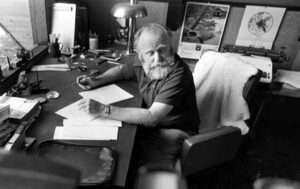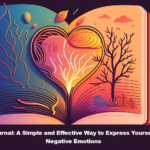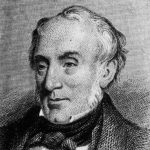Frank Herbert was a legendary author in the Dune series and made an indelible mark on the domain of science fiction and literature. His deep quotes continue to resonate with readers providing timeless wisdom transcending time and genre.
In this article, we will explain some of the popular quotes by Frank Herbert, revealing their meanings as well as the contexts where they were written.
Frank Herbert Legacy
During his career, which spanned many decades, Frank Herbert wrote numerous novels, short stories as well as essays. However, it is the Dune series that can be regarded as his greatest work. In 1965, he published Dune which introduced readers to a richly imagined universe full of political intrigues, ecological awareness and profound philosophical thoughts.
His complexity of writing themes within narratives has earned him a place among the best science fiction writers ever lived.
Most Popular Frank Herbert Quotes
Herbert’s quotations often focus on themes such as terror; power; learning; human being experiences. Prominently featured in Dune series these aspects also reflect wider philosophical meditations by Herbert himself. By using expressions he poses questions about life on people.

-
I must not fear. Fear is the mind-killer. Fear is the little-death that brings total obliteration. I will face my fear. I will permit it to pass over me and through me. And when it has gone past I will turn the inner eye to see its path. Where the fear has gone there will be nothing. Only I will remain.
-
The mystery of life isn’t a problem to solve, but a reality to experience.
-
He who controls the spice controls the universe.
-
There is no real ending. It’s just the place where you stop the story.
-
The people who can destroy a thing, they control it.
-
When religion and politics travel in the same cart, the riders believe nothing can stand in their way.
-
To suspect your own mortality is to know the beginning of terror.
-
The purpose of argument is to change the nature of truth.
-
The beginning of knowledge is the discovery of something we do not understand.
-
I must not fear. Fear is the mind-killer. Fear is the little-death that brings total obliteration. I will face my fear. I will permit it to pass over me and through me. And when it has gone past I will turn the inner eye to see its path. Where the fear has gone there will be nothing. Only I will remain.
-
There is no real ending. It’s just the place where you stop the story.
-
Seek freedom and become captive of your desires. Seek discipline and find your liberty.
-
If wishes were fishes, we’d all cast nets.
-
What has mood to do with it? You fight when the necessity arises—no matter the mood! Mood’s a thing for cattle or making love or playing the baliset. It’s not for fighting.
-
Try looking into that place where you dare not look! You’ll find me there, staring out at you!
-
Survival is the ability to swim in strange water.
-
Fear is the mind-killer.
-
The people who can destroy a thing, they control it.
-
Greatness is a transitory experience. It is never consistent. It depends in part upon the myth-making imagination of humankind. The person who experiences greatness must have a feeling for the myth he is in. He must reflect what is projected upon him. And he must have a strong sense of the sardonic. This is what uncouples him from belief in his own pretensions. The sardonic is all that permits him to move within himself. Without this quality, even occasional greatness will destroy a man.
-
Belief can be manipulated. Only knowledge is dangerous.
-
Once men turned their thinking over to machines in the hope that this would set them free. But that only permitted other men with machines to enslave them.
-
A process cannot be understood by stopping it. Understanding must move with the flow of the process, must join it and flow with it.
-
He who controls the spice controls the universe.
-
Without change something sleeps inside us, and seldom awakens. The sleeper must awaken.
-
The mind can go either direction under stress—toward positive or toward negative: on or off. Think of it as a spectrum whose extremes are unconsciousness at the negative end and hyperconsciousness at the positive end. The way the mind will lean under stress is strongly influenced by training.
-
The mind commands the body and it obeys. The mind orders itself and meets resistance.
-
It is impossible to live in the past, difficult to live in the present and a waste to live in the future.
-
Education is no substitute for intelligence.
-
It is so shocking to find out how many people do not believe that they can learn, and how many more believe learning to be difficult.
-
When religion and politics travel in the same cart, the riders believe nothing can stand in their way. Their movements become headlong – faster and faster and faster. They put aside all thoughts of obstacles and forget the precipice does not show itself to the man in a blind rush until it’s too late.
-
Absolute power does not corrupt absolutely, absolute power attracts the corruptible.
-
Deep in the human unconscious is a pervasive need for a logical universe that makes sense. But the real universe is always one step beyond logic.
-
The mystery of life isn’t a problem to solve, but a reality to experience.
-
Humans live best when each has his place.
-
Education is no substitute for intelligence.
-
Parting with friends is a sadness. A place is only a place.
-
The best art imitates life in a manner that makes the viewer recognize it but in a new way.
-
The worst potential competition for any organism can come from its own kind.
-
Humans live best when each has his place.
-
Loneliness encourages men to court danger.
-
Men and their works have been a disease on the surface of their planets before now.
-
It is so much easier to be cynical. Courage requires resolution.
-
The mind is an infinite resource.
-
The wise man molds himself—the fool lives only to die.
-
Dreams are messages from the deep.
-
What senses do we lack that we cannot see or hear another world all around us?
Read More: The Secret Quotes by Rhonda Byrne
-
Hope clouds observation.
-
There is no escape—we pay for the violence of our ancestors.
-
Time does not count itself. You have only to look at a circle and this is apparent.
-
Religion often partakes of the myth of progress that shields us from the terrors of an uncertain future.
-
The more life you have, the more it feeds on itself.
-
The flesh surrenders itself, he thought. Eternity takes back its own.
-
Ideas are a part of the whole human matrix.
-
How often it is that the angry man rages denial of what his inner self is telling him.
-
The mind commands the body and it obeys. The mind orders itself and meets resistance.
-
Empires do not suffer emptiness of purpose at the time of their creation. It is when they have become established that aims are lost and replaced by vague ritual.
-
Confine yourself to observing and you always miss the point of your own life.
-
The end justifies the means. But what if there never is an end? All we have is means.
-
Repression makes a religion flourish.
-
You do not take from this universe, it grants you what it will.
-
All governments suffer a recurring problem: Power attracts pathological personalities.
-
The highest function of ecology is understanding consequences.
-
One does not obtain or take to oneself consciousness. It grows in one and expresses itself in one.
-
To use raw power is to make yourself infinitely vulnerable to greater powers.
-
Life cannot find reasons to sustain itself without a world of order.
-
The function of science fiction is not always to predict the future but sometimes to prevent it.
-
It is not that power corrupts but that it is magnetic to the corruptible.
-
Men rarely recognize the devil when he is putting his hand on their shoulder.
-
The person who takes the last step will be in control.
-
The first rule of governance is self-restraint.
-
The stakes in conflict do not change. They merely evolve.
-
Governments, if they endure, always tend increasingly toward aristocratic forms.
-
Truth suffers from too much analysis.
-
A man does not automatically become a subject to society because of his birth.
Also Read: Inspiring William Wordsworth Quotes On Love, Life, and Beauty
-
He who controls the past commands the future. He who commands the future conquers the past.
-
What do you despise? By this are you truly known.
-
Enemies make you stronger, allies make you weaker.
-
Power attracts the corruptible. Suspect all who seek it.
-
To know a thing well, know its limits. Only when pushed beyond its tolerances will true nature be seen.
-
The concept of progress acts as a protective mechanism to shield us from the terrors of the future.
-
A beginning is the time for taking the most delicate care that the balances are correct.
-
The mind commands the body and it obeys. The mind orders itself and meets resistance.
-
Knowing where the trap is—that’s the first step in evading it.
-
Do actions agree with words? There’s your measure of reliability. Never confine yourself to the words.
The Influence of These Quotations by Herbert
Herbert’s quotes have influenced both literature and philosophy for centuries. Today’s literary artists are inspired by his works and take up similar ideas in their own works.
Still today, his philosophical reflections continue to affect modern thought, whether or not it force us to think about fear; power or human existence.
Conclusion
Frank Herbert’s quotes do not only inspire but also challenge readers while offering them with timeless wisdom. As villagers in intricate spaces of Dune or looking broadly at philosophy as a whole through his writings’ eyes, one is made aware of great truths about mankind, which range from self-discovery to universe exploration. Even though we traverse various paths, our wayfarer always upheld courage while investigating dark places, embracing life’s mysteries and seeing with an open heart.
Frequently Asked Questions
Did Frank Herbert Finish Dune?
Absolutely not! As planned, Frank Herbert did not complete the Dune series. He only wrote six more books after the 1985 publication of Chapterhouse: Dune.
Certainly, he intended to pen more volumes to bring a fitting end but died before so doing. Consequently, Brian Herbert, his son and Kevin J. Anderson used his notes to write books that would conclude the story for him.
What is Frank Herbert most famous for?
Frank Herbert is best known for his classic science fiction novel Dune series, which extensively explores political, religious, and environmental issues.
Why are Frank Herbert’s quotes so memorable?
Herbert’s quips have remained in the minds of many since they deal with some universal subjects and questions that go deep into philosophy to appeal all generations of readers.
How has Dune influenced modern science fiction?
Dune is a work that impacted modern science fiction by being filled up with intricate world-building, complex characters and profound themes. Since then, it established the bar for other authors of such works.
What are frequent topics in Herbert’s sayings?
A lot of what he said dealt on fear, power, knowledge, authority and humanity. These things are vital to him and also it is evident through this wider outlook on philosophy.
Ways I Can Apply Wisdom from Frank Herbert to My Life
Confront your fears; be prepared for everything else embrace uncertainty; yearn to know more about the intricacies around power relations; learn about how you may control and manipulate others in your personal or professional life, according to Herbert.





















